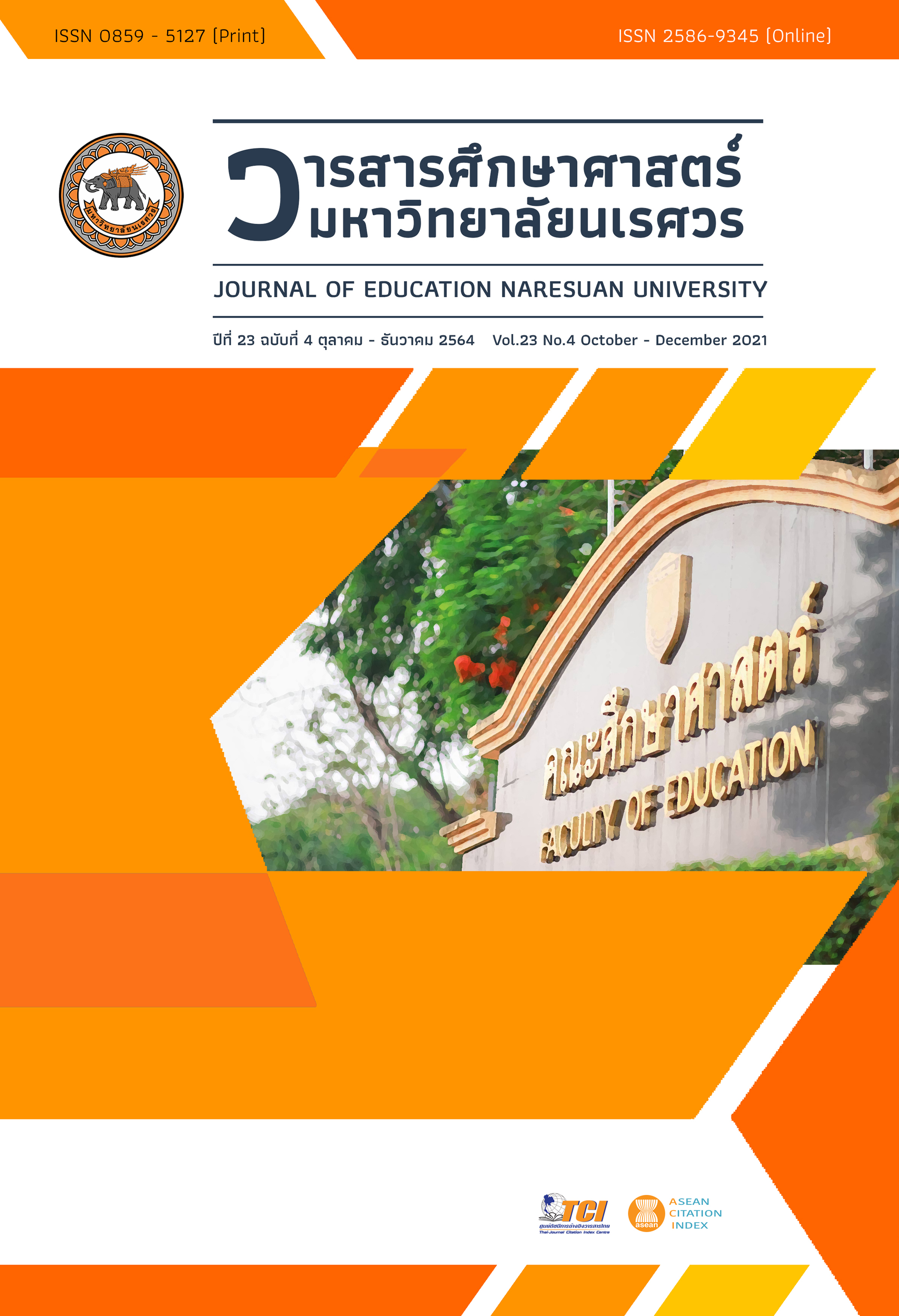HOW TEACHERS FACILITATE CIVIC DISCOURSE TO ENHANCE STUDENTS’ CITIZENSHIP: A QUALITATIVE STUDY OF THAI SECONDARY SOCIAL STUDIES CLASSROOMS การส่งเสริมวาทกรรมพลเมืองเพื่อความเป็นพลเมืองของนักเรียน: การศึกษาเชิงคุณภาพจากชั้นเรียนวิชาสังคมศึกษาระดับมัธยมศึกษาของประเทศไทย
Main Article Content
Abstract
The research aims at analyzing teachers’ facilitating methods used during discussions in order to develop civic discourses in secondary social studies classroom. The data were gathered by interviewing 6 social studies teachers with recording audio and observing during classroom discussions in 8 social studies classes. All qualitative data were analyzed in accordance with Habermasean civic discourse framework. The results showed the methods teachers used to promote quality of civic discourses in 4 aspects: 1) Accessibility; teachers asked key questions that encouraged students to participate in the discussion and used various techniques to involve students into the conversation, 2) Equality; both verbal and non-verbal communications were used to promote equality in class discussions, 3) Rationality and Criticality; three patterns were found including encouraging students to express their opinions logically, encouraging students to discuss based on information and developing students’ skills in expressing opinions, and 4) Consensus-building; teachers contributed greatly in developing classrooms, with multiple strategies, to reach consensus. In addition, findings also pointed out the relationship between teachers' beliefs in building citizens and how they designed and facilitated classroom discussions.
Article Details
The owner of the article does not copy or violate any of its copyright. If any copyright infringement occurs or prosecution, in any case, the Editorial Board is not involved in all the rights to the owner of the article to be performed.
References
Aasebø, T. S. (2017). Classroom discussions: Possibilities and limitations for democratic classroom practices. Education Reform Journal, 2(1), 1-16.
Alivernini, F., & Manganelli, S. (2011). Is there a relationship between openness in classroom discussion and students’ knowledge in civic and citizenship education? Procedia-Social and Behavioral Sciences, 15, 3441-3445. https://doi.org/10.1016/j.sbspro.2011.04.315
Avery, P. G., Levy, S. A., & Simmons, A. M. (2013). Deliberating controversial public issues as part of civic education. The Social Studies, 104(3), 105–114.
Boyle-Baise, M., & Zevin, J. (2009). Young citizens of the world: Teaching elementary social studies through civic engagement. New York: Routledge.
Bureau of Academic Affairs and Education Standards. (2010). Civic education Youth power Citizen power: Citizenship Education. Bangkok: Office of the Basic Education Commission. [in Thai]
Carrasco, D., & Irribarra, D. T. (2018). The role of classroom discussion. In Teaching tolerance in a globalized world (pp. 87-101). Springer, Cham.
Cooper, D. (2007). Is civic discourse still alive? Museums & Social Issues, 2(2), 157–163. https://doi.org/10.1179/msi.2007.2.2.157
Farkas, K. R. (2010). Preparing students for active and informed civic discourse. Teaching English in the Two Year College, 38(1), 35.
Farkas, K. R. (2013). Citizen (in) action: The limits of civic discourse in city council meetings. Critical Discourse Studies, 10(1), 81–98. https://doi.org/10.1080/17405904.2012.736702
Habermas, J. (1989). The structural transformation of the public sphere: an inquiry into a category of bourgeois society. Cambridge, MA: MIT Press.
Harris, D. E. (2002). Classroom assessment of civic discourse. Education for democracy: Contexts, curricula, assessments, 211-232.
Holley, L. C., & Steiner, S. (2005). Safe space: Student perspectives on classroom environment. Journal of Social Work Education, 41(1), 49-64. https://doi.org/10.5175/JSWE.2005.200300343
Kuş, Z. (2015). Science and social studies teachers’ beliefs and practices about teaching controversial issues: Certain comparisons. Journal of Social Science Education, 84-97.
Larson, B. E. (2000). Classroom discussion: A method of instruction and a curriculum outcome. Teaching and Teacher Education, 16(5-6), 661-677.
Legate, M. (2018). Civil discourse in the classroom: Preparing for academic and civic participation (Master thesis). Lincoln: Graduate College of University of Nebraska Lincoln.
Lintner, T. (2018). The Controversy over Controversy in the Social Studies Classroom. SRATE Journal, 27(1), 14-21.
McKee, R. J. (2015). Encouraging classroom discussion. JSSE-Journal of Social Science Education, 66-73. https://doi.org/10.4119/jsse-736
Manganelli, S., Lucidi, F., & Alivernini, F. (2015). Italian adolescents' civic engagement and open classroom climate: The mediating role of self-efficacy. Journal of Applied Developmental Psychology, 41, 8-18. https://doi.org/10.1016/j.appdev.2015.07.001
McHugh, M. L. (2012). Interrater reliability: The Kappa statistic”. Biochemia Medica, 22(3), 276-282.
Michaels, S., O’Connor, C., & Resnick, L. B. (2008). Deliberative discourse idealized and realized: Accountable talk in the classroom and in civic life. Studies in philosophy and education, 27(4), 283-297.
Panke, S., & Stephens, J. (2018). Beyond the echo chamber: Pedagogical tools for civic engagement discourse and reflection. Educational Technology and Society, 21(1), 248–263.
Phipps, S. B. (2010). High school social studies teachers' beliefs and education for democratic citizenship (Doctoral dissertation). Retrieved from ProQuest Dissertations & Theses database. (UMI No. 3427163)
Saldaña, J. (2013). The coding manual for qualitative researchers (3rd ed.). Thousand Oaks, CA: Sage.
Schuitema, J., Radstake, H., van de Pol, J., & Veugelers, W. (2018). Guiding classroom discussions for democratic citizenship education. Educational Studies, 44(4), 377–407. https://doi.org/10.1080/03055698.2017.1373629
Schuitema, J., Van Boxtel, C., Veugelers, W., & Ten Dam, G. (2011). The quality of student dialogue in citizenship education. European Journal of Psychology of Education, 26(1), 85–107. https://doi.org/10.1007/s10212-010-0038-1
Schuitema, J., Veugelers, W., Rijlaarsdam, G., & ten Dam, G. (2009). Two instructional designs for dialogic citizenship education: An effect study. British Journal of Educational Psychology, 79(3), 439-461.
Thaewanarumitkul, P. (2008). Civic education. Bangkok: Nanmeebooks. [in Thai]
Vinterek, M. (2010). How to live democracy in the classroom. Education Inquiry, 1(4), 367-380.
Westheimer, J. (2015). What kind of citizen?: Educating our children for the common good. New York: Teacher College Press.
Westheimer, J., & Kahne, J. (2004). Educating the “Good” citizen: Political choices and pedagogical goals. Political Science & Politics, 37(2), 241-247. https://doi.org/10.1017/S1049096504004160


